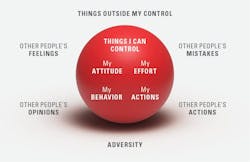Tough-minded optimism: Strategies to thrive, not just survive
Dale Carnegie, writer and author of such famous books as How to Win Friends and Influence People, said, “One of the most tragic things I know about human nature is that all of us tend to put off living. We are all dreaming for some magical rose garden over the horizon instead of the roses that are blooming outside our windows today.”1 This hesitation to live life, the inability to see the value in what we have, and the frustration of not having what we want seems to be pervasive in today’s world. As a professional coach, many reach out to me with feelings of despair, confusion, and pessimism. These are very powerful feelings that can make any of us put off living, lose hope, and wish for more rose gardens. In these challenging times, no one wants to hear a Pollyanna hear-no-evil, see-no-evil comeback such as “Oh you’re just having a bad day, tomorrow will be better!” Instead, we are searching for understanding. We need a more practical approach to rise us out of our darkness. We need realism — to see things as they are and yet find a path forward. We long to feel optimistic but it feels like a bridge too far.
Tough-Minded Optimism is a way of thinking presented in the book The Power of Optimism written by Alan Loy McGinnis, 1990.2 Although written 34 years ago and long out of print, McGinnis’s book provides an evergreen approach to addressing and tackling problems head-on. As a respected psychologist and researcher, McGinnis studied the intellectual habits of people who faced significant setbacks but still became extremely successful. He summarized his findings into 12 characteristics that can easily become habits embedded into our lives today.
Tough-minded optimists are seldom surprised by trouble.
The world is full of problems. Do you think of yourself as a problem solver? Think back to any setback in your life. While at the time, you may have thought it impossible to succeed, did life go on? Did you find another way? Of course you did because you were forced to look at other options. Our biggest breakthroughs often come after our biggest breakdowns. Paul Romer, Nobel Laureate Economist said, “A crisis is a terrible thing to waste.”3 A mistake is only a mistake if we do not learn from it. Anticipate problems and try to find the lesson when bad things happen.
Tough-minded optimists look for partial solutions.
It is easy to feel overwhelmed by a challenge. One of the greatest obstacles to success is perfectionism. Brené Brown, in her book The Gifts of Imperfection, describes perfectionism as a defense mechanism that people use, thinking that if they look perfect or if everything they do or say is perfect, they can avoid or minimize the pain of shame, judgement, or blame. But there is no such thing as perfect. Studies show the drive to be perfect actually impedes achievement and is correlated with depression, anxiety, addiction, and life paralysis.4 Don’t let perfect get in the way of good enough.
Tough-minded optimists believe they have control over their future.
When Albert Einstein was a boy, he received this comment from his teacher, “Albert is a very poor student. He is mentally slow, unsociable, and is always daydreaming. He is spoiling it for the rest of the class. It would be in the best interests of all if he were removed from school at once.”5 Think of all the scientific discoveries that would not have happened if Einstein let that discourage him. Instead, he continued his passion and believed in himself. You cannot control what happens to you, but you can control how you react to it.
Tough-minded optimists allow for regular renewal.
Author Anne Lamott said, “Almost everything will work again if you unplug it for a few minutes, including you.”6 Keeping your energy high and understanding what you need for regular renewal is essential to building and sustaining resiliency in today’s challenging world. Whether you enjoy socializing with friends, spending time with children, eating healthy food, or taking a nap, find out what fills your bucket and make the time to mindfully enjoy it.
Tough-minded optimists interrupt their negative trains of thought.
This can be very challenging. Do you have an unconscious train of negative thoughts taking over your brain? We are certainly our own worst critic, but the continuous put-downs do nothing to increase confidence or success. One tip for improvement is to pay attention to the words you use. Do you unintentionally catastrophize things by using words like “always” and “never”? Do you tend to jump to worst case scenarios? Mark Twain said, “I’ve had a lot of worries in my life, most of which never came true.”7 Don’t let the past or future rob you of your peace today.
Tough-minded optimists heighten their powers of appreciation.
There is always something to be thankful for. Increase your awareness of the beauty around you. The rain, the sunshine, a blooming flower, the food on your plate, the support of a friend or loved one, a kind gesture. In the words of Oprah Winfrey “Gratitude can transform any situation. It alters your vibration, moving you from negative energy to positive. It’s the quickest, easiest, most powerful way to effect change in your life, this I know for sure.”8
Tough-minded optimists use their imaginations to rehearse success.
Professional athletes use visualization and imagery to create an increase in mental awareness, which boosts confidence and overall well-being. Repeatedly, this has shown to provide a competitive advantage in performance.9 If you want to pitch a new idea to your supervisor, or need to have a difficult conversation with someone, visualize it going well, see the look on their faces, and feel your confidence rise as they listen intently. From there, it also becomes easier to develop strategies to turn the conversation around if it is not going well.
Tough-minded optimists are cheerful even when they can’t be happy.
It is realistic to know that life is not all rainbows and unicorns, but it is equally realistic to understand that we all have the conscientious ability to choose how we think. You can choose to think the worst, or you can choose to see what is good in any situation. “What lies behind us and what lies before us are tiny matters compared to what lies within us,” Ralph Waldo Emerson.10 Choose wisely.
Tough-minded optimists believe they have an almost unlimited capacity for stretching.
Contrary to popular belief that humans only use 10% of their brain, recent studies using functional magnetic resonance imagining (fMRI) show that most of our brain is in use most of the time, even when performing simple tasks, resting, or sleeping.11 Staying active both physically and mentally, eating well, exercising our brains through solving puzzles, and the very nature of our jobs as laboratory scientists allow for increased cognitive function and brain synapsis renewal.12
Tough-minded optimists build lots of love into their lives.
In a study performed at University of California, Berkeley, seven thousand adults were studied over nine years. They found that people with weak social ties had a death rate two to five times higher than those with strong social ties.13 We are the sum average of the people we hang out with. Tip the scales in your favor by reducing the amount of time you spend with negative people and surround yourself with those who love, encourage, and challenge you in a positive way.
Tough-minded optimists like to swap good news.
When was the last time you heard a speech that moved you, a book you read that made you cry, a movie so compelling you lost track of all reality. These are all examples of impactful story telling. Artist and film director Phillipp Humm said, “Through the art of storytelling, we can preserve our heritage, educate future generations, and inspire change.”14 Tough-minded optimists understand that constant complaining only brings themselves and others down.
Tough-minded optimists accept what cannot be changed.
Charles Darwin, who developed the Theory of Evolution said, “It is not the strongest of the species that survives, nor the most intelligent. It is the one that is most adaptable to change.”15 Many of us go through life beating our heads against the wall, trying to force our own plans for the future when often, the future has other plans. Flexibility is a virtue and the one thing we can all count on is change. Stay curious and be a life-long learner. Remember the things you can control and the things you cannot. (See Figure 1.)
Conclusion
This article gives a brief outline of each of the 12 characteristics that make a Tough-Minded Optimist. If even one or two of these characteristics resonate, I feel confident that with practice, your life will feel a little lighter and the future will seem a little brighter. Be real, be tough, and stay optimistic.
References
1. Carnegie D. A quote by dale Carnegie. Goodreads.com. Accessed November 19, 2024. https://www.goodreads.com/quotes/180216-one-of-the-tragic-things-i-know-about-human-nature.
2. Loy McGinnis A. The Power of Optimism. San Francisco:Harper & Row; 1990.
3. Manzo P. A crisis is a terrible thing to waste. Stanford Social Innovation Review. Published online 2010. doi:10.48558/KYJD-P694.
4. Brown B. GIFTS of IMPERFECTION : 10th Anniversary Edition. Hazelden. Published online 2022:74-77.
5. Loy McGinnis A. The Power of Optimism. San Francisco:Harper & Row; 1990: 39.
6. Lamott A. A quote by Anne Lamott. Goodreads.com. Accessed November 19, 2024. https://www.goodreads.com/quotes/6830146-almost-everything-will-work-again-if-you-unplug-it-for.
7. Twain M. A quote by Mark Twain. Goodreads.com. Accessed November 19, 2024. https://www.goodreads.com/quotes/201777-i-ve-had-a-lot-of-worries-in-my-life-most.
8. Website-files.com. Accessed November 19, 2024. https://cdn.prod.website-files.com/5f6cc9cd16d59d990c8fca33/6515752583b692abb91d04db_gratitude-quotes-famous-2.jpg.
9. Elizabeth Quinn MS. How imagery and visualization can improve athletic performance. Verywell Fit. Updated July 4, 2021. Accessed November 19, 2024. https://www.verywellfit.com/visualization-techniques-for-athletes-3119438.
10. Krstic Z. 103 quotes about managing anxiety to help comfort you through tough days. Good Housekeeping. January 28, 2023. Accessed November 19, 2024. https://www.goodhousekeeping.com/health/wellness/a42396674/anxiety-quotes/.
11. Burgess L. How much of our brain do we actually use? Brain facts and myths. Medicalnewstoday.com. Updated July 17, 2024. Accessed November 19, 2024. https://www.medicalnewstoday.com/articles/321060.
12. Johnson J. Brain exercises: 22 ways to improve memory, cognition, and creativity. Medicalnewstoday.com. Updated April 4, 2023. Accessed November 19, 2024. https://medicalnewstoday.com/articles/brain-exercises?.
13. Loy McGinnis A. The Power of Optimism. San Francisco:Harper & Row; 1990:114-115.
14. Humm P. 23 inspirational storytelling quotes. Power of Storytelling. November 25, 2021. Accessed November 19, 2024. https://power-of-storytelling.com/storytelling-quotes/.
15. Meah A. 25 inspirational quotes on Adaptability. AwakenTheGreatnessWithin. October 16, 2023. Accessed November 19, 2024. https://www.awakenthegreatnesswithin.com/25-inspirational-quotes-on-adaptability/.
About the Author

Patty J. Eschliman, MHA, MLS(ASCP), DLM, CPC
is a Certified Professional Coach who specializes in laboratory leadership growth and professional support. As President and CEO of The Lab Leader Coach, Patty coaches many lab professionals in all roles in the areas of building leadership skills, preventing burnout, improving communication, building cohesive teams, and how to be a positive influencer. She has 39 years of experience as a Medical Laboratory Scientist, the last 29 spent in leadership.

